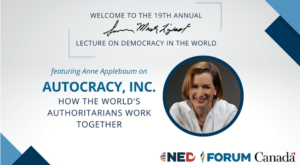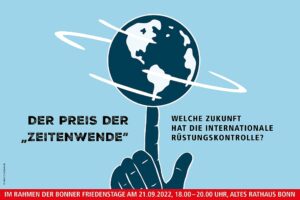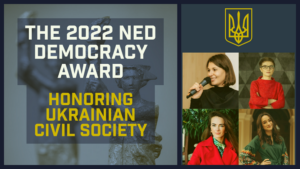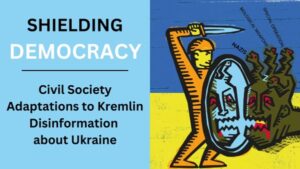The U.S. has imposed sanctions and visa restrictions on five Russian officials and an expert witness involved in the incarceration of opposition activist Vladimir Kara-Murza, who has been imprisoned in Moscow since April for speaking out against Russia’s invasion of Ukraine, AP reports.
Russia’s war is receiving critical assistance from authoritarian regimes around the world, according to Justin Daniels, assistant editor of the Journal of Democracy. These networks weren’t created overnight but reflect prolonged efforts by Russia, China, and likeminded regimes to make the world safe for autocracy. Their activities include neutering international civil society, spreading disinformation, and exporting surveillance technology, he writes for Foreign Policy:
- Iranian drones have played a “central role” in attacks on Ukrainian civilians. And more are coming: ….. Tehran also turned to Russia for counsel on defusing protests sparked by Mahsa Amini’s death, so the Kremlin reportedly dispatched advisors.
- The United Arab Emirates bills itself as a haven for sanctioned Russian oligarchs, making it easy for them to come, buy Emirati citizenship, and park their yachts, planes, and ill-gotten gains.
 The Kremlin in particular views these networks as fundamental to maintaining power at home and waging a perceived existential struggle against the West, Daniels adds. In other words, autocrats already see their struggles against democracy as interconnected and act accordingly.
The Kremlin in particular views these networks as fundamental to maintaining power at home and waging a perceived existential struggle against the West, Daniels adds. In other words, autocrats already see their struggles against democracy as interconnected and act accordingly.
The war in Ukraine is a theater for two competing development paths: Russia’s oligarchic capitalism and Ukraine’s burgeoning civil society, argues Janine R. Wedel, a univesity professor at George Mason University’s Schar School of Policy and Government. Western countries should mark this distinction, because oligarchic capitalism has increasingly taken root within their own systems of economic and political governance. The Ukrainians, meanwhile, have offered an alternative: people working together democratically to fashion a better collective future, she writes for Project Syndicate:
The weakening of the Ukrainian state created an opening for civil society and collaborative organizing. Owing to this space for mobilization from below, the Ukrainian state was newly empowered after Russia’s annexation of Crimea and incursions into eastern Ukraine in 2014. Since then, it has been able to impose some limits on the power of the oligarchs, including those serving Kremlin interests.

Credit: FES
The notion of a Zeitenwende—a major turning point—is not just German anymore. Putin’s war has become a Zeitenwende for all Europe, according to William Kristol, editor-at-large of The Bulwark, and Jeffrey Gedmin, cofounder and editor-in-chief of American Purpose.
This broad European Zeitenwende won’t be easy. But the new frontline European nations are looking ahead. They see a need and opportunity for new structures that can protect European democracies for years to come. And there’s a growing conviction that victory in Ukraine can and should lead to meaningful political change in Russia itself, they add, reflecting on recent meetings in Berlin cohosted by American Purpose and the Renew Democracy Initiative.
 The forcible transfers of civilians from Ukraine to Russia or Russian-controlled territory is not only a legal violation, note Oleksandra Matviichuk, Natalia Arno and Jasmine D. Cameron. The Russian government also is manipulating reports of the transfers as its propaganda machine fuels a range of disinformation and nationalistic narratives, such as the false idea that it is “saving” the Ukrainians from Nazis who supposedly dominate Ukraine’s government and military, they write for Just Security:
The forcible transfers of civilians from Ukraine to Russia or Russian-controlled territory is not only a legal violation, note Oleksandra Matviichuk, Natalia Arno and Jasmine D. Cameron. The Russian government also is manipulating reports of the transfers as its propaganda machine fuels a range of disinformation and nationalistic narratives, such as the false idea that it is “saving” the Ukrainians from Nazis who supposedly dominate Ukraine’s government and military, they write for Just Security:
Ukraine’s civil society, with the help of international partners, has taken on the arduous, challenging, and laborious work to help document and counter this illegal practice, as we outline in a broader forthcoming report by our organizations – the Center for Civil Liberties (CCL), the Free Russia Foundation (FRF), and the American Bar Association’s Center for Human Rights (ABA/CHR), respectively. The report will analyze various aspects of the filtration system and examine individual cases based on international humanitarian law, international criminal law, and international human rights law and standards.
 A new report from the National Endowment for Democracy’s International Forum suggests that Ukraine and its allies are pulling ahead in the battle for the information space.
A new report from the National Endowment for Democracy’s International Forum suggests that Ukraine and its allies are pulling ahead in the battle for the information space.
One year since the launch of Russia’s full-scale invasion, Ukraine and its allies appear to be finding success in the competition for narratives in the information space—due, in large part, to civil society innovation, adds NED’s Digital Directions.
Despite the danger, NED’s courageous Ukrainian partners (above) have continued their work during the war to document war crimes and atrocities; advocate for international support, mobilize thousands of volunteers across the country; provide independent news, and promote government transparency and accountability.
In a new film, “Slava Ukraini” (below), the writer and filmmaker Bernard-Henri Lévy warns of a heavy price if the West fails to defeat Putin in Ukraine, The New York Times reports.
A new @ThinkDemocracy report suggests that #Ukraine and its allies are pulling ahead in the battle for the information space. Despite Russian efforts to sow division in Europe, support for Ukraine remains strong. Eurobarometer data from late 2022 supports this impression: pic.twitter.com/VRstYOVHxi
— Forum @ NED (@ThinkDemocracy) March 3, 2023







